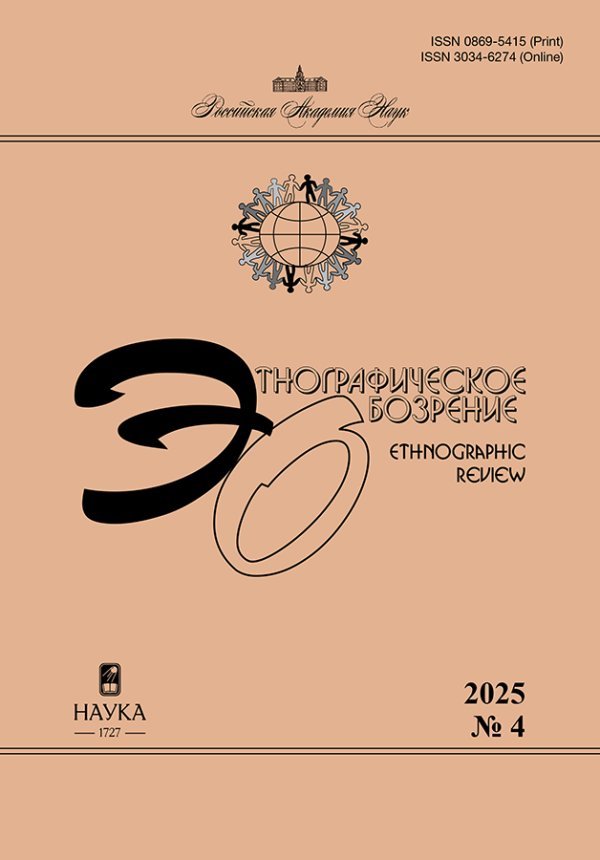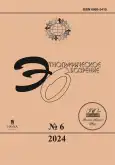Labor and Work in the Ethics of Contemporary Orthodoxy: Restoring a Peasant House, Monastery and Holy Russia
- Authors: Yarovaya P.R.1
-
Affiliations:
- Higher School of Economics – Saint Petersburg Branch
- Issue: No 6 (2024)
- Pages: 81-96
- Section: Special Theme of the Issue: Economic Anthropology of Household Outside Metropolitan Areas in Contemporary Russia
- URL: https://gynecology.orscience.ru/0869-5415/article/view/672376
- DOI: https://doi.org/10.31857/S0869541524060057
- EDN: https://elibrary.ru/VTSLKR
- ID: 672376
Cite item
Abstract
Drawing on the case of the repair of a peasant house by residents of a dilapidated (and also being restored) Orthodox monastery in the Russian North, the article raises the question of the relationship between theology and economics of economic ethics. The ethnographic analysis of this article focuses on the categories of “labor” and “work” in the practice of restoration and on the example of the hegumen of the monastery and his wards. My argument is that the spiritualization of “labor” and the theological understanding of the “laborer” in the context of the restoration of the Church is opposed to the economic (secular) strategies of “work” and “worker”. The hegumen inscribes the reconstruction of the destroyed peasant house into the general concept of the restoration of the church, which is carried out in the conditions of modernity and its challenges. The restoration of the Church seems to the hegumen and his wards not so much a “work” to repair cultural monuments, but a “labor” to return to the pre-revolutionary way of life, which is the prototype of a utopian paradise, Holy Russia. “Labor” and “work” are different by their temporalities: work is aimed at the result in the future while labor as spiritual practice is grounding for the return to the past. The article examines how the methodology of the ideal types of connection between Protestant ethics and capitalism (Weber) can be applied in the context of Orthodox economic ethics (Zabaev) through Weber's “understanding” methodology. The purpose of the article is to point out the inconsistency of binary oppositions used to interpret labor and work practices in an Orthodox monastery, and the need to consider them in the context of the historical continuity of practices and their meanings.
Keywords
Full Text
About the authors
Polina R. Yarovaya
Higher School of Economics – Saint Petersburg Branch
Author for correspondence.
Email: pryarovayaa@gmail.com
ORCID iD: 0009-0002-0828-7854
стажер-исследователь, аспирант
Russian Federation, Saint PetersburgReferences
- Asad, T. 2003. Formations of the Secular: Christianity, Islam, Modernity. Stanford: Stanford University Press.
- Bauman, Z. 2018. “Retrotopia”. Revista Española de Investigaciones Sociológicas (REIS) 163: 155–158.
- Dubovka, D.G. 2020. V monastyr’ s mirom: v poiskakh svetskikh kornei sovremennoi dukhovnosti [To the Monastery with the World: In Search of the Secular Roots of Modern Spirituality]. St. Petersburg: Izdatel’stvo Evropeiskogo universiteta v Sankt-Peterburge.
- Ferguson, J. 1985. The Bovine Mystique: Power, Property and Livestock in Rural Lesotho. Man. New Series 20 (4): 647–674. https://doi.org/10.2307/2802755
- Geertz, K. 2004. Interpretatsiia kul’tur [The Interpretation of Cultures]. Moscow: ROSSPEN.
- Harding, S.F. 2018. Convicted by the Holy Spirit: The Rhetoric of Fundamental Baptist Conversion. In Across the Boundaries of Belief, by M. Klass and M. Weisgrau, 381–401. London: Routledge. https://doi.org/10.4324/9780429502569
- Hobbes, T. 2016. Leviathan. In Democracy: A Reader, edited by R. Blaug and J. Schwarzmantel, 37–42. New York: Columbia University Press.
- Kruglova, A. 2017. Social Theory and Everyday Marxists: Russian Perspectives on Epistemology and Ethics. Comparative Studies in Society and History 59 (4): 759–785. https://doi.org/10.1017/S0010417517000275
- Kormina, Z.V., A.A. Panchenko, and S.A. Shtyrkov. 2006. Sny Bogoroditsy: issledovaniia po antropologii religii [The Dreams of the Virgin: Studies in the Anthropology of Religion]. St. Petersburg: Izdatel’stvo Evropeiskogo universiteta v Sankt-Peterburge.
- Kormina, Z.V., A.A. Panchenko, and S.A. Shtyrkov. 2015. Izobretenie religii: desekuliarizatsiia v postsovetskom kontekste [The Invention of Religion: Desecularization in the Post-Soviet Context]. St. Petersburg: Izdatel’stvo Evropeiskogo universiteta v Sankt-Peterburge.
- Mannheim, K. 2013. Ideology and Utopia. New York: Routledge.
- Platonov, O.A. 1991. Russkii trud [Russian Labour]. Moscow: Sovremennik.
- Rev, I. 1998. Retrotopia: Critical Reason Turns Primitive. Current Sociology 46 (2): 51–80. https://doi.org/10.1177/0011392198046002006
- Robbins, J. 2001. Secrecy and the Sense of an Ending: Narrative, Time, and Everyday Millenarianism in Papua New Guinea and in Christian Fundamentalism. Comparative Studies in Society and History 43 (3): 525–551. https://doi.org/10.1017/S0010417501004212
- Slezkine, Y. 2017. The House of Government: A Saga of the Russian Revolution. Princeton: Princeton University Press.
- Smolkin, V. 2021. Sviato mesto pusto ne byvaet: istoriia sovetskogo ateizma [A Holy Place is Never Empty: The History of Soviet Atheism]. Moscow: NLO.
- Ssorin-Chaikov, N.V. 2021. Antropologiia vremeni: ocherk istorii i sovremennosti [The Anthropology of Time: History and the State of the Art]. Etnograficheskoe obozrenie 6: 83–103.
- Strathern, M. 2004. Partial Connections. Savage: Rowman & Littlefield Publishers.
- Tosheva, D. 2011. Ot vosstanovleniia khrama k sozdaniiu obshchiny: samoogranichenie i material’nye trudnosti kak istochniki prikhodskoi identichnosti [From the Restoration of the Church to the Creation of a Community: Self-Restraint and Material Difficulties as Sources of Parish Identity]. In Prikhod i obshchina v sovremennom pravoslavii: kornevaia sistema rossiiskoi religioznosti [Parish and Community in Modern Orthodoxy: The Root System of Russian Religiosity], edited by A. Agadzhanyan and K. Russele, 277–297. Moscow: Ves’ mir.
- Tumarkin, N. 1997. Lenin Lives!: The Lenin Cult in Soviet Russia. Cambridge, Mass: Harvard University Press.
- Weber, M. 1949. “Objectivity” in Social Science and Social Policy. The Methodology of the Social Sciences, by M. Weber, 49–112. Glencoe: The Free Press.
- Weber, M. 2002. The Protestant Ethic and the “Spirit” of Capitalism and Other Writings. London: Penguin.
- Weber, M. 2023. Bureaucracy. In Social Theory Re-Wired: New Connections to Classical and Contemporary Perspectives, edited by W. Longhofer and D. Winchester, 271–276. London: Routledge.
- Yurchak, A. 2015. Bodies of Lenin: The Hidden Science of Communist Sovereignty. Representations 129: 116–157. https://doi.org/10.1525/rep.2015.129.1.116
- Yurchak, A. 2017. The Canon and the Mushroom: Lenin, Sacredness, and Soviet Collapse. HAU: Journal of Ethnographic Theory 7 (2): 165–198. https://doi.org/10.14318/hau7.2.021
- Zabaev, I.V. 2012. Osnovnye kategorii khoziaistvennoi etiki sovremennogo russkogo pravoslaviia: sotsiologicheskii analiz [The Main Categories of Economic Ethics of Modern Russian Orthodoxy: A Sociological Analysis]. Moscow: Izdatel’stvo PSTGU.
- Zabaev, I.V. 2018. Smirenie v khoziaistvennoi etike Russkoi pravoslavnoi tserkvi: ispol’zovanie sotsiologii religii Maksa Vebera dlia analiza sovremennogo russkogo pravoslaviia [Humility in the Economic Ethics of Russian Orthodox Church: Using Max Weber’s Sociology of Religion to Analyze Modern Russian Orthodoxy]. Gosudarstvo, religiia, tserkov’ v Rossii i za rubezhom 36 (4): 175–202. https://doi.org/10.22394/2073-7203-2018-36-4-175-202
Supplementary files








